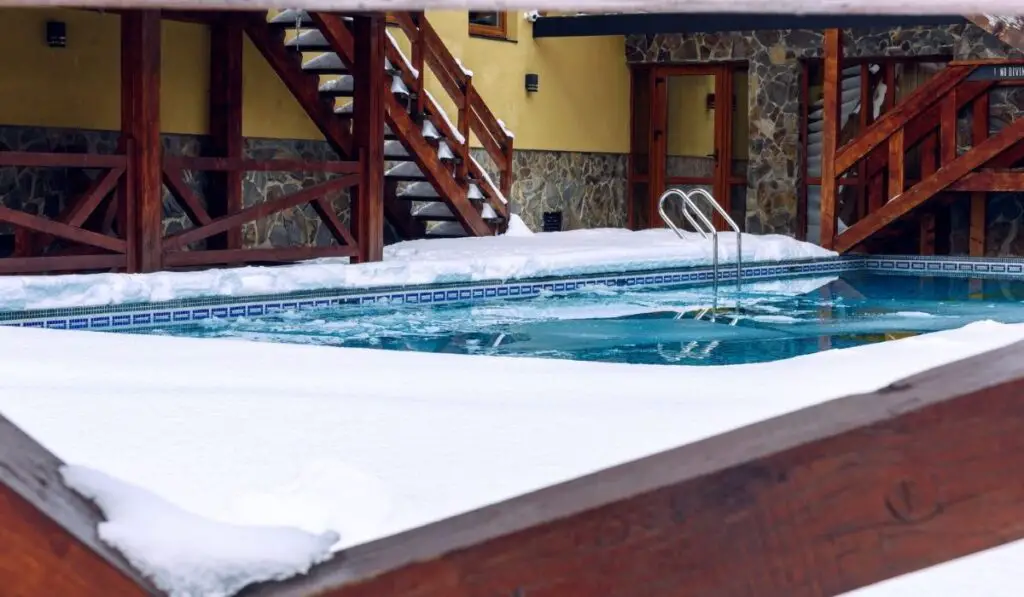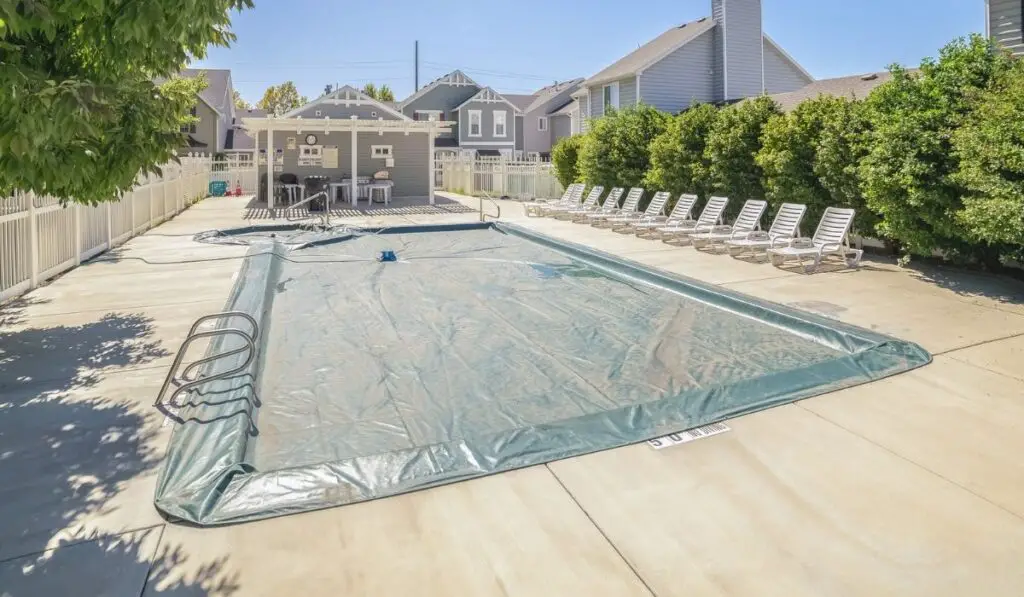Having a pool is great for the summer when the temperatures are high and you want a relaxing place to cool off. In the winter, however, it can pose a real problem — especially in places where the temperature dips so low that your pool is in danger of freezing. Freezing not only disrupts the water, but it can also damage the pool structure itself.
To prevent freeze damage to your pool, you can use a range of techniques including running the pool pump, adding swimming pool antifreeze, or turning on the heater (if you have one). Partially draining and disconnecting the filter and pump is best practice to reduce the chances of damage.
Let’s take a closer look at when you should be worried about your pool freezing over and what to do when the temperatures drop low enough for it to be a very real possibility. With a little attention, you can make sure your pool is set to ride out the winter and be ready for fun in the spring and summer!
At What Temperature Does Pool Water Freeze?

Although you might think a pool can withstand lower temperatures than normal water because of the chemicals in it, that’s unfortunately just a myth. Just like other water, a pool will freeze at 32 degrees Fahrenheit.
Saltwater pools can withstand temperatures that are a little lower; they can make it to 28 degrees before they freeze. However, it’s a negligible difference, and it’s best to assume that if temperatures drop anywhere close to freezing, your pool may be in trouble if you don’t take the necessary precautions.
What Happens if Your Pool Freezes?
If you’re too late to take preventative action and your pool has frozen over — or the temperatures got too low despite your precautionary measures — here’s what you need to know.
If there’s a thin sheet of ice over the top of your pool, then you don’t need to worry much about it. Anything less than half an inch should melt away as the temperatures warm up again, and no further action is required.
If the sheet is thicker, you will need to do something. There are many things it could damage, including:
- The skimmer
- The pool pipes
- The vinyl liner, especially if already has a leak
- Pool covers
Make sure you break the ice and drain the water below the tile line. Ten to twelve inches should do it. Once you’ve done that, make sure you run the pump in the pool to keep things moving and prevent any ice from forming again.
What if Your Pool Is Completely Frozen?
In the worst-case scenario, like during a power blackout, the entire pool might freeze. In this case, you’ll have to take quick action:
- Turn off all of the electrical equipment around the pool for now
- Pour hot water on the valve to thaw out the ice that’s there
- Cover the pipes with blankets and blow hot air to thaw any ice on and in them
- Run the pump
By following these steps, you may be able to defrost the pool on your own. However, if you’re having trouble or the damage looks severe, it’s best to call a professional.
You can make things worse if you’re not sure what you’re doing or if the ice has already begun to do some severe damage. In these cases, it’s always best to consult a professional. After all, the damage that can result from a frozen pool could easily cost you more than the professional assistance.
How to Keep Your Pool From Freezing (and Related Questions)
The best way to prevent damage is to take steps beforehand to avoid a frozen pool. Don’t wait until your pool has frozen over to protect it. The best ways to do this are:
- Keep the pool pump running
- Heat the pool
- Cover the pool
- Use a freeze protector
- Angle the pool jets up
- Keep the proper chemical balance in the water
- Use an antifreeze (on Amazon) for the pool
- Maintain the correct water level
Will Running the Pool Pump Prevent Freezing?
Yes, running the pool pump will prevent your pool from freezing! Keeping the pool pump going creates movement, and moving water cannot freeze. Doing this is safe when the temperatures drop as it generates a steady stream and doesn’t give the water a chance to settle.
Will Heating the Pool Prevent Freezing?
This is perhaps the most obvious way to prevent freezing because yes, using a water heater will clearly keep the pool water above freezing level. However, it’s also the most costly.
You may have to run your water heater twelve hours a day to keep it warm, so the ability to employ this method very much depends on your budget. It’s also not the most environmentally friendly option.
Will Covering the Pool Prevent Freezing?
In a sense, covering the pool can help to prevent freezing. This won’t make a major difference, but if it’s a couple of degrees, it could matter, because the cover will lock in some heat. Buy a pool cover (on Amazon) if the temperature gets down to around thirty-two degrees.
It’s important to know that if a sheet of ice does freeze over the pool, your pool cover might get damaged. The shards of ice could rip into it.
What Is a Freeze Protector?
A pool freeze protector (on Amazon) works by turning on the pool pump when the outside temperature reaches a certain point. That means you don’t have to leave the pump running when it’s not necessary. It may be a worthwhile investment.
Angle Pool Jets Up to Stop the Surface From Freezing
If you angle the pool jets upward, it can stop a sheet from forming over the surface. Keep in mind that when water freezes, it starts from the surface and then spreads downward.
While a sheet up to half an inch isn’t a big deal, any more can cause damage, and it’s still better to prevent any freezing at all.
Does Keeping the Proper Chemical Balance Help?
Unfortunately, chlorine water doesn’t freeze at a lower temperature than regular water. However, it’s still important to maintain the proper chemical balance and a pH of 7.2-7.4 to ensure that you’re maintaining the pool properly.
Freeze damage is a lot harder to correct when you haven’t been taking care of the pool.
So no, adding more chlorine to your pool is not a safeguard against freezing — but it’s still important.
Does Antifreeze Really Work?
One last thing you should buy is pool antifreeze. This chemical solution is likely the best thing to ensure your pool is protected — and yes, it really works!
What Is the Correct Water Level?
Your water level should be a few inches below the tile line, as this gives snow less room to settle and makes it less likely the water will freeze.
How to Keep an Above-Ground Pool From Freezing

While most of the above tips are applicable to inground pools, above-ground pools are a different beast. Some tips are still applicable — like keeping an appropriate water level — but for the most part, you’ll need to use some different tactics to keep your pool in the best shape possible through winter.
Cover the Pool
The most obvious thing you’ll have to do is cover the pool. Leaving your pool uncovered in winter is a huge mistake. Chances are you aren’t using it anyway, so you’re giving debris the chance to build up and leaving the water exposed to the elements.
Use an Air Pillow
Buying an air pillow (on Amazon) and placing it on the water under your cover can help prevent the water from freezing. The way it works is very simple: it helps keep water off your pool cover, so you can retain heat without compressing everything and causing a sheet of ice to form in the cold months.
If ice does form, it also won’t damage your pool cover and will be easier to break apart with no damage.
Keep Cleaning the Pool
Although you may not be using the pool in winter, that doesn’t mean you should neglect its maintenance. Keep cleaning the pool by removing any leaves that fall on the pool cover, and you should especially clean off snow buildup any time it snows. Snow buildup makes it much easier for the pool to freeze.
Check the Water Level Often
As with an inground pool, you should also check the water level often. If it rises up too much, there’s more of a chance of it freezing, and rain and snow can get in there and make it rise before you realize it. Give it a glance after inclement weather and you’ll be glad you did.
Should I Close My Pool for Winter?
Unless you live in a particularly warm area, it’s the best thing to do. Closing your pool for winter preserves the water and ensures nothing can get in there to damage the pool equipment.
How to Close a Pool for Winter
First, make sure you balance the water with the right chemicals. As always, the pH should be between 7.2 and 7.4. You’ll also want to make sure that you clean the pool properly, since the last thing you want to do is close it and have algae and debris swimming in there. Scoop out any debris with a pool net and scrub the walls to get rid of any bacteria.
Next, you should add a phosphate remover (on Amazon). Phosphates help algae growth, so this should help to prevent that while the pool is closed.
If you live in a place where temperatures rarely dip below freezing, you may not have to lower the water level. However, it’s better to be safe than sorry, and this step is a must if you do live in a place that might freeze.
You should also make sure you backwash the pool and clean the pipes. Backwashing is the process of cleaning the filter by pushing everything through it backwards to get rid of the bacteria and dirt, and it will help ensure your pool is completely clean by the time you close it.
Once you’ve done that, ensure you remove all pool equipment and install your winter pool cover. Make sure to check on the pool regularly if you do get a power blackout or unusually extreme temperatures.
